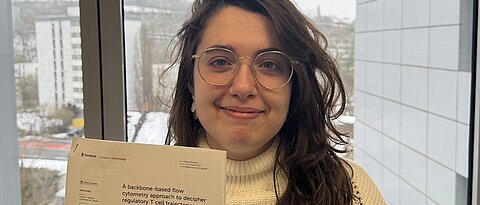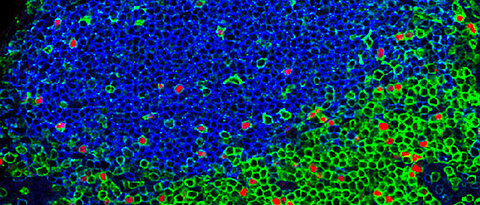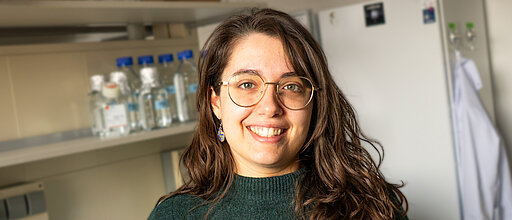Microbiota-specific CD4 T cell memory
The human intestine is home to the densest accumulation of microbes on earth – the gut microbiota – and the last 2 decades have revealed that our immune system actively engages with these mostly beneficial inhabitants. CD4 T cells are important immune cells induced by the gut microbiota and crucial for maintaining intestinal homeostasis. While beneficial for barrier protection, dysregulated CD4 T cell responses to the gut microbiota can result in chronic inflammation as in inflammatory bowel disease (IBD). Whereas long-lived memory T cells are critical components of vaccine-induced protection, it has remained elusive whether non-pathogenic gut commensals also induce T cell memory. Understanding this may be key for better mucosal immunisation and understanding disease relapses in quiescent IBD.
In this project funded by an ERC Starting Grant, we combine newly developed models of transient colonisation of germ-free mice by prototypic gut commensals with cutting-edge immunological tools to understand how non-pathogenic gut bacteria induce long-lived tissue-resident CD4 T cell memory. Our main questions are (1) how such Th cells are maintained and regulated in the tissue, (2) how their phenotype is shaped by host and microbial factors during induction and challenge, and (3) what their physiological importance is for epithelial homeostasis, barrier protection, and control of luminal bacteria. Overall, this project shall elucidate the regulation of microbiota-specific memory Th cells to eventually enhance mucosal vaccine design and enable the selective targeting of IBD-perpetuating Th cells.
Publications (selection)
Full publication list J.Zimmermann
F. Schmidt*, J. Zimmermann*, T. Tanna*, R. Farouni, T. Conway, A. J. Macpherson*, R. J. Platt*, Noninvasive assessment of gut function using transcriptional recording sentinel cells. Science 376, eabm6038 (2022). *equal contribution
C. Stehle, T. Rückert, R. Fiancette, D. W. Gajdasik, C. Willis, C. Ulbricht, P. Durek, M.-F. Mashreghi, D. Finke, A. E. Hauser, D. R. Withers, H.-D. Chang, J. Zimmermann*, C. Romagnani*, T-bet and RORα control lymph node formation by regulating embryonic innate lymphoid cell differentiation. Nat Immunol 22, 1231–1244 (2021). *equal contribution
B. Yilmaz*, C. Mooser*, I. Keller*, H. Li, J. Zimmermann, L. Bosshard, T. Fuhrer, M. G. de Agüero, N. F. Trigo, H. Tschanz-Lischer, J. P. Limenitakis, W.-D. Hardt, K. D. McCoy, B. Stecher, L. Excoffier, U. Sauer, S. C. Ganal-Vonarburg, A. J. Macpherson, Long-term evolution and short-term adaptation of microbiota strains and sub-strains in mice. Cell Host Microbe 29, 650-663.e9 (2021). *equal contribution
K. Gronke*, P. P. Hernández*, J. Zimmermann, C. S. N. Klose, M. Kofoed-Branzk, F. Guendel, M. Witkowski, C. Tizian, L. Amann, F. Schumacher, H. Glatt, A. Triantafyllopoulou, A. Diefenbach, Interleukin-22 protects intestinal stem cells against genotoxic stress. Nature 566, 249–253 (2019). *equal contribution
J. Zimmermann, P. Durek, A. A. Kühl, F. Schattenberg, P. Maschmeyer, F. Siracusa, K. Lehmann, K. Westendorf, M. Weber, R. Riedel, S. Müller, A. Radbruch, H. Chang, The intestinal microbiota determines the colitis-inducing potential of T-bet-deficient Th cells in mice. Eur. J. Immunol. 48, 161–167 (2017).
J. Zimmermann*, T. Hübschmann*, F. Schattenberg, J. Schumann, P. Durek, R. Riedel, M. Friedrich, R. Glauben, B. Siegmund, A. Radbruch, S. Müller, H. Chang, High-resolution microbiota flow cytometry reveals dynamic colitis-associated changes in fecal bacterial composition. Eur. J. Immunol. 46, 1300–1303 (2016). *equal contribution
J. Zimmermann, A. A. Kühl, M. Weber, J. R. Grün, J. Löffler, C. Haftmann, R. Riedel, P. Maschmeyer, K. Lehmann, K. Westendorf, M.-F. Mashreghi, M. Löhning, M. Mack, A. Radbruch, H. D. Chang, T-bet expression by Th cells promotes type 1 inflammation but is dispensable for colitis. Mucosal Immunol 9, 1487–1499 (2016).
J. Zimmermann, A. Radbruch, H. Chang, A Ca2+ concentration of 1.5 mM, as present in IMDM but not in RPMI, is critical for maximal response of Th cells to PMA/ionomycin. Eur. J. Immunol. 45, 1270–1273 (2015).










